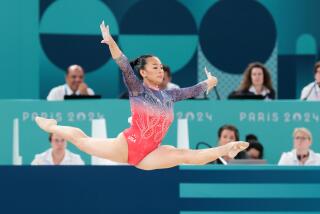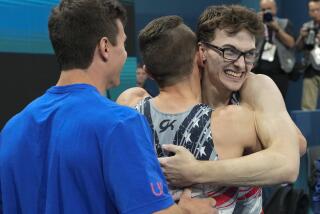Perfection From ‘Great Rider’ : Pommel Horse Master Li Xiao Ping Boosts Titan Gymnastics
The slow, swaying beat of reggae music echoes through the halls of Cal State Fullerton’s Titan Gym. Inside the mat room, the gymnasts stretch and tumble, warming up for their Thursday workout. Some sway their hips and knees to the rhythm, others raise and lower their outstretched palms, like birds in slow-motion flight.
Off to the side, Li Xiao Ping--World Champion and Olympic silver medalist--stands motionless, his arms folded loosely. His eyes stare at the yellowed tiles of the gym’s ceiling; his concentration seems unbreakable. In these mental gymnastics, Li sees what most American gymnasts do not.
“When you are in training, you must make yourself like competition,” said Li, a member of the Fullerton gymnastics team and the first Chinese gymnast to compete for an American university. “In training, I think of many people, watching, cheering. When I’m in competition, I think of training. All champions do this.”
The music is turned off, and the gymnasts gather around Titan Coach Dick Wolfe, who begins his pep talk for tonight’s match at 8 against UCLA, the nation’s top-ranked men’s team. Wolfe speaks of the importance of warming up properly, getting enough rest and washing their hands to prevent illness. A few of the men turn and bob their heads, but Li, sitting in front, stares at Wolfe.
Since coming to Fullerton from his native Shanghai six months ago, Li, 24, has done much to boost the Titan program. His presence alone has lifted the team spirit and provided hope for an NCAA championship. Many of his teammates praise his leadership--one that comes not by words, but by action.
“I think the biggest effect he has had is having someone in the gym that gives the illusion of perfection,” senior Brock Wilson said. “The first time I saw him on the pommel horse, I thought it was beautiful. I’d never seen anyone with such abilities in person. He was so above everyone else.”
Li’s journey to Fullerton began last February when Lan Wang, a computer science student at Fullerton, overheard Wolfe and Alex Omalev, former Titan basketball coach, joking about having a Chinese gymnast in the program. Wang, who was born in Shanghai and lived with the Omalev family, asked Wolfe if he would give a scholarship to a Chinese gymnast.
After a long process of correspondence with Chinese officials and Fullerton administrators, Wolfe got a call from the Chinese government and was given Li’s flight number and arrival time at Los Angeles International Airport.
After warmups, the team moves to the gym for a limited practice for the upcoming meet. Most of the gymnasts peel off their sweats and wear only spandex tights and T-shirts, revealing thick, muscular thighs and powerful shoulders.
Li is dressed in plain gym shorts and a Camp Ronald McDonald T-shirt. At 5-feet 7-inches and 145 pounds, Li doesn’t appear strong enough to hold himself up on the parallel bars for more than a minute. His thighs lack the definition of quadriceps or hamstrings. His arms have softball-size biceps, not the bowling ball look of his teammates’.
But once in action, Li is a wonder.
Called the “Great Rider” because of his talents on the pommel horse, Li has received scores of 10 five times in international competition--and his 1981 World Championship--in that event. His superiority is achieved primarily because of his ability to travel backward on the pommel horse, a trick he invented and mastered. He is the world’s only gymnast who successfully does the trick.
When his turn comes for the parallel bars, many of his teammates turn to watch. His movements are smooth, his transitions clean. His arms raise his body gracefully, his toes point, his legs remain parallel without appearing taut or rigid. A beautiful dismount draws a smile from Wolfe.
“When he came here, I asked myself, ‘What will I be able to teach him?’ ” Wolfe said. “The general idea is that you just put him in a gym, lock the doors and he trains perfectly. That’s not it. He’s not a machine. He’s not a god. He’s a human being too.”
Li proved that at the Aggie Invitational meet Jan. 10 at UC Davis. During his routine on the horizontal bar, Li lost his grip and strained his shoulder. Despite the pain, he continued and led the Titans to the meet championship. That included defeating Arizona State, the defending NCAA champion, 269-265. Through rehabilitation, Li’s shoulder has recuperated.
“He gives so much to our team,” senior Harry Loupakis said. “Our motivation has gone up, and he’s taught us the importance of mental preparation.”
Li’s mental training was noticed by Ken Ravizza, a sports psychologist who works with the Titans. Ravizza had been teaching performance visualization and relaxation techniques for some time, and in Li, he had a perfect example.
“These (mental abilities) such as imagery and tension control have taken us (American sports psychologists) years to develop,” Ravizza said. “But Xiao Ping learned them and does them all on his own.
“In competition, the first thing he does is walk out and touch the equipment. He looks up at the apparatus on the ceiling--the lights and beams--studying them like an artist shaping his materials together in his eyes. Most Americans go right in and just work out. Li knows to absorb everything. On deck, he is total concentration. And when he finishes his routine, he’ll be finished, but his arms stay up. He’s still locked into concentration. Then he very slowly lowers his arms to his sides. I’ve never seen an athlete with such intensity.”
Though there is little doubt Li helps Fullerton in more ways than tournament points, what does Fullerton--and the United States--offer Li Xiao Ping?
For one, Li is receiving the American education he has long desired. Though NCAA age requirements allow him only one year of competition, Li plans to earn a physical education degree while he works as Wolf’s assistant the next three years. After that, he said he will return to Shanghai to teach and coach gymnastics.
“They (my teammates) teach me many things,” Li said. “They help me translate, (though) sometimes I don’t have to ask. (Now) I know about American culture, I understand what is American president. Yes, this is interesting.”
“Halloween (is) also very new to me. Thanksgiving. Christmas. You go into people’s homes, they give you food, and you sing ‘Jingle Bells, Jingle Bells.’ I think it very nice.”
But while Li has enjoyed the United States, he retains a deep love for China and its people. Especially Wen Jia, who he married three weeks before leaving. She will join Li here in April.
“In China, we are not so fast,” Li said. “Here, things are very fast. You eat while driving. Everything, all people just move, move. In China there are no cars. If you want to see a friend, you walk to their house. In China, it takes a long time.”
Wednesday night, Li celebrated the Chinese New Year. He spent time with his Chinese friends, feasting on specialties from many regions of China. They spoke of favorite places there, their friends and families. And they played Chinese music, a violin concert titled “Liang Shen-bo, Zhu Yin-dai,” that Li says one day he will bring to fill the halls of Titan Gym for his new American friends to hear.
More to Read
Go beyond the scoreboard
Get the latest on L.A.'s teams in the daily Sports Report newsletter.
You may occasionally receive promotional content from the Los Angeles Times.









